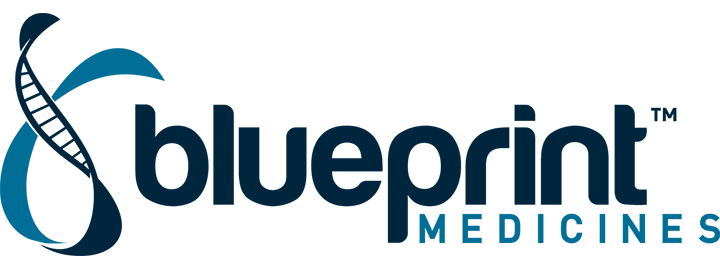- Cancer Care Team
Cancer Care Team
To deliver optimal patient outcomesProducts and Services
Cancer Type
Supplies & Tools
Scientific Focus
- Biopharma Partners
- Patients
- Education & Events
- Login
- Contact Us


No-Charge KIT D816V Testing*
Blueprint's Biomarker Testing Program
Blueprint’s Biomarker Testing Program
Please provide a few details about your practice and a Program Representative will be in touch with you shortly to help you with your inquiry.
*Required fields
Blueprint's Biomarker Testing Program for Systemic Mastocytosis
Systemic Mastocytosis (SM) is a rare disorder characterized by neoplastic proliferation of mast cells driven by the KIT D816V mutation in greater than 90% of cases.1 Early biomarker testing using a non-invasive, highly sensitive, and quantitative KIT D816V test may reduce a patient’s time to diagnosis. This test is provided by Labcorp Oncology for eligible patients at no-charge through the sponsored testing program from Blueprint Medicines.*
Participating in the Program
1
Request Welcome Package
Request a welcome package from the Labcorp Program Team (by clicking HERE) to receive information on account setup and detailed instructions for test ordering and reporting.
2
Order the KIT D816V test
Confirm patient meets the eligibility criteria (see Program Eligibility section below) and complete the test requisition form. Then collect the specimen and contact Labcorp to schedule a pickup.
OR
Send patient to one of our Labcorp Patient Service Centers along with completed test requisition form for specimen collection.
3
Receive Results
Results will be reported to the healthcare provider based on report receipt preferences (i.e., Labcorp Link).
Labcorp patients can access their results via the Labcorp Patient Portal.
Program Eligibility
Patient must be age 18 or older, have not been tested previously under this program, AND have TWO or more of the following signs and symptoms of systemic mastocytosis.
| Clinical Features |
|
| History |
|
| Lab Findings |
|
About Systemic Mastocytosis
Systemic Mastocytosis (SM) is a rare, clonal, neoplastic proliferation of mast cells, resulting in heterogeneous symptoms due to infiltration of clonal mast cells in different organ systems, including, but not limited to, bone marrow, GI tract, skin, liver and spleen.2,3,4
The median time from symptom onset to the diagnosis of SM can take up to seven years and involve patients visiting multiple specialists.5 Additionally, prognosis for patients with advanced forms of systemic mastocytosis is poor with median survival ranging from less than six months to three years depending on subtype.6,7 With its prevalence in greater than 90% of cases, the KIT D816V mutation is both a hallmark of SM and part of the clinical criteria for diagnosing SM.8,9
Patients with SM may have severe, unpredictable symptoms that negatively affect quality of life, including, but not limited to:
- Adult-onset cutaneous mastocytosis10
- Anaphylaxis (in adult patients), often severe and presenting with cardiovascular features, including hypotensive syncope5
- Chronic diarrhea, nausea, and vomiting5
Role of KIT D816V Mutation in SM
The vast majority of adult patients with SM have the KIT D816V mutation, with studies showing an increase in levels of the KIT D816V mutation when comparing indolent SM to aggressive SM.1,3,6,11 Low-sensitivity assays may fail to detect the KIT D816V mutation and testing for this mutation using a non-invasive and highly sensitive test may shorten patients’ time to diagnosis.8,12 Patients diagnosed with SM with the KIT D816V mutation may respond to treatments targeting this mutation.8 Additionally, monitoring levels of the KIT D816V mutation may aid in the evaluation of a patients’ response to treatment and disease progression.13
The KIT D816V Digital PCR test by Labcorp is a highly sensitive assay that detects this mutation down to 0.03%.
Resources
Sample Report KIT D816V Digital PCR (positive)
Sample Report KIT D816V Digital PCR (negative)
suspectsm.com – an educational resource about SM for healthcare professionals developed by Blueprint Medicines.
References
- Garcia-Montero AC, et al. KIT mutation in mast cells and other bone marrow hematopoietic cell lineages in systemic mast cell disorders: a prospective study of the Spanish Network on Mastocytosis (REMA) in a series of 113 patients. Blood. 2006; 108 (7): 2366–2372.
- Vaes M, et al. Targeted Treatment Options in Mastocytosis. Front Med. 2017;4:110.
- Jara-Acevedo M, et al. Detection of the KIT D816V mutation in peripheral blood of systemic mastocytosis: diagnostic implications. Mod Pathol. 2015; 28(8):1138-1149.
- Rossignol J, et al. Recent advances in the understanding and therapeutic management of mastocytosis. F1000Res. 2019; 8.
- Jennings SV, et al. Patient Perceptions in Mast Cell Disorders. Immunol Allergy Clin of North Am. 2018; 38(3): 505-525.
- Lim KH, et al. Systemic mastocytosis in 342 consecutive adults: survival studies and prognostic factors. Blood. 2009; 113(23):5727-5736.
- Sperr WR, et al. International prognostic scoring system for mastocytosis (IPSM): a retrospective cohort study. Lancet Haematol. 2019 Dec; 6(12): e638-e649.
- Pardanani A, et al. Systemic mastocytosis in adults: 2021 Update on diagnosis, risk stratification and management. Am J Hematol. 2021 Apr 1; 96(4):508-525.
- Valent P, et al. Mastocytosis: 2016 updated WHO classification and novel emerging treatment concepts. Blood. 2017 Mar 16; 129(11): 1420–1427.
- Berezowska S, et al. Adult-onset mastocytosis in the skin is highly suggestive of systemic mastocytosis. Mod Pathol. 2014; 27(1):19–29.
- Greiner G, et al. Digital PCR: A Sensitive and Precise Method for KIT D816V Quantification in Mastocytosis. Clin Chem. 2018 March 01; 64(3): 547–555.
- Arock M, et al. KIT Mutation Analysis in Mast Cell Neoplasms: Recommendations of the European Competence Network on Mastocytosis. Leukemia. 2015 June; 29(6): 1223–1232.
- Erben P, et al. The KIT D816V expressed allele burden for diagnosis and disease monitoring of systemic mastocytosis. Ann Hematol. 2014; 93:81–88.
*The KIT D816V test will be provided at no-charge to patients, healthcare providers, and payers through this program. Excludes office visit, sample collection for tests not associated with this program, and any other related costs to patients. Labcorp will not bill the eligible patient’s insurance for KIT D816V test, however, Labcorp will bill selected payer(s) for other testing services ordered.
Healthcare Provider Program Attestation Language
The healthcare provider (“You” or “Your”) is responsible for ordering testing under this program in accordance with your own medical judgment and applicable laws. You understand that Blueprint Medicines Corporation will cover the cost of testing for eligible patients and the testing will be performed by Labcorp. You understand the eligibility criteria set forth above and have determined that the patient meets those criteria. The Patient has been informed by You that Blueprint Medicines covers the cost of the testing and the Patient understands that they are under no obligation to purchase or use any Blueprint Medicines products or services. The Patient also has been informed by You that no identifiable patient data will be shared with Blueprint Medicines as part of this program. You understand and acknowledge that (i) You will not seek reimbursement for this no-charge test from any third party, including but not limited to government healthcare programs and the Patient;; (ii) You are not obligated to recommend, purchase, order, prescribe, promote or use any product or service offered by Blueprint Medicines or Labcorp; (iii) You are not obligated to participate in or to encourage patients to participate in any clinical trial or other research program conducted by Blueprint Medicines; and (iv) You will participate in the Program in accordance with applicable laws. You consent to the sharing of organization and clinician contact information with Blueprint Medicines, who may contact You and your organization directly in connection with the Program. You attest that You are authorized under applicable law to order this test and that the Patient meets the eligibility criteria.
More Information About This Program
Blueprint’s Biomarker Testing Program is offered by Blueprint Medicines as a way to help people make more informed decisions about their health. Through this program, Blueprint Medicines, under an arrangement with Labcorp, makes KIT D816V testing available at no-charge for patients who are being evaluated for systemic mastocytosis.
- While Blueprint Medicines provides financial support for this program, testing services are performed by an independent third party and Blueprint Medicines assumes no liability and provides no warranties for the testing services provided by independent third parties.
- Healthcare professionals shall use independent medical judgment in determining whether patients meet the program criteria for participation.
- No identifiable patient data will be shared with Blueprint Medicines as part of this program.
- This program is available in the United States only.
- Healthcare professionals and patients who use this program have no obligation to recommend, purchase, order, prescribe, promote, administer, use, or support any Blueprint Medicines or Labcorp product or service.
- No payers, including government payers, are billed for this program.



